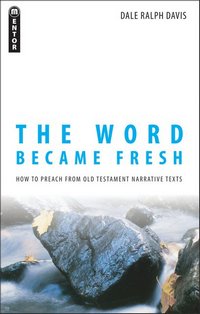 |
The Word Became Fresh:
|

Dale Ralph Davis is one of those authors I’ve meant to read for ages now, I’ve seen him quoted and referred to for as long as I can remember and I just hadn’t gotten around to reading any of his work. This book seemed like a decent place to start.
What’s The Word Became Fresh About?
In the preface, Davis sets out the impetus for the book—too many Christians see the Old Testament as unimportant, or too complicated to understand—it’s good for a couple of morality lessons or the occasional Psalm, but that’s about it.
I still believe that traditional Old Testament criticism has had the effect of killing the Old Testament for the church. This little tome can hardly reverse that, but it is meant as an exercise in reading the Old Testament for fun and profit. As my mother- in- law used to say, ‘It’s different anyway.’ And maybe it will help.
While yes, the book is intended as a help for preachers*, these tools can and should be used by the laity in their personal reading.
* Maybe I’m just a snob, but if preachers don’t have the tools to handle the Old Testament passages at this level already, perhaps they skimped on their training.
Davis describes and then illustrates several principles to be used when approaching (primarily narrative) Old Testament texts to help the reader focus on the main ideas and themes of the passages without getting bogged down in the minutiae. The illustrations are plentiful and insightful—and are probably the best part of the book—taken from all over the Old Testament to help illustrate how useful they are for a variety of texts.
So, what did I think about The Word Became Fresh?
The writing is warm, approachable, and engaging—I can see why so many people have quoted Davis in the various things I’ve read—and I can see myself quoting him in the future (and reading more of him to get those quotations).
While I found the principles and tools he lays out to be helpful, I’m not sure I needed any of them. I’ve been exposed to—and using—most of them (generally without knowing I was using a hermeneutical tool, which should’ve been obvious to me).
What I found most helpful is his illustrations, seeing this stuff at work—and the conclusions (both exhortations and assurances) that he draws from his examples. These turn each chapter into a collection of sermonettes for handy use.
I’m not sure I learned a lot from this book, but I really appreciated the time I spent in the book and the gems I was able to collect from Davis. This won’t be my last book by him.

This post contains an affiliate link. If you purchase from it, I will get a small commission at no additional cost to you. As always, opinions are my own.
![]()

